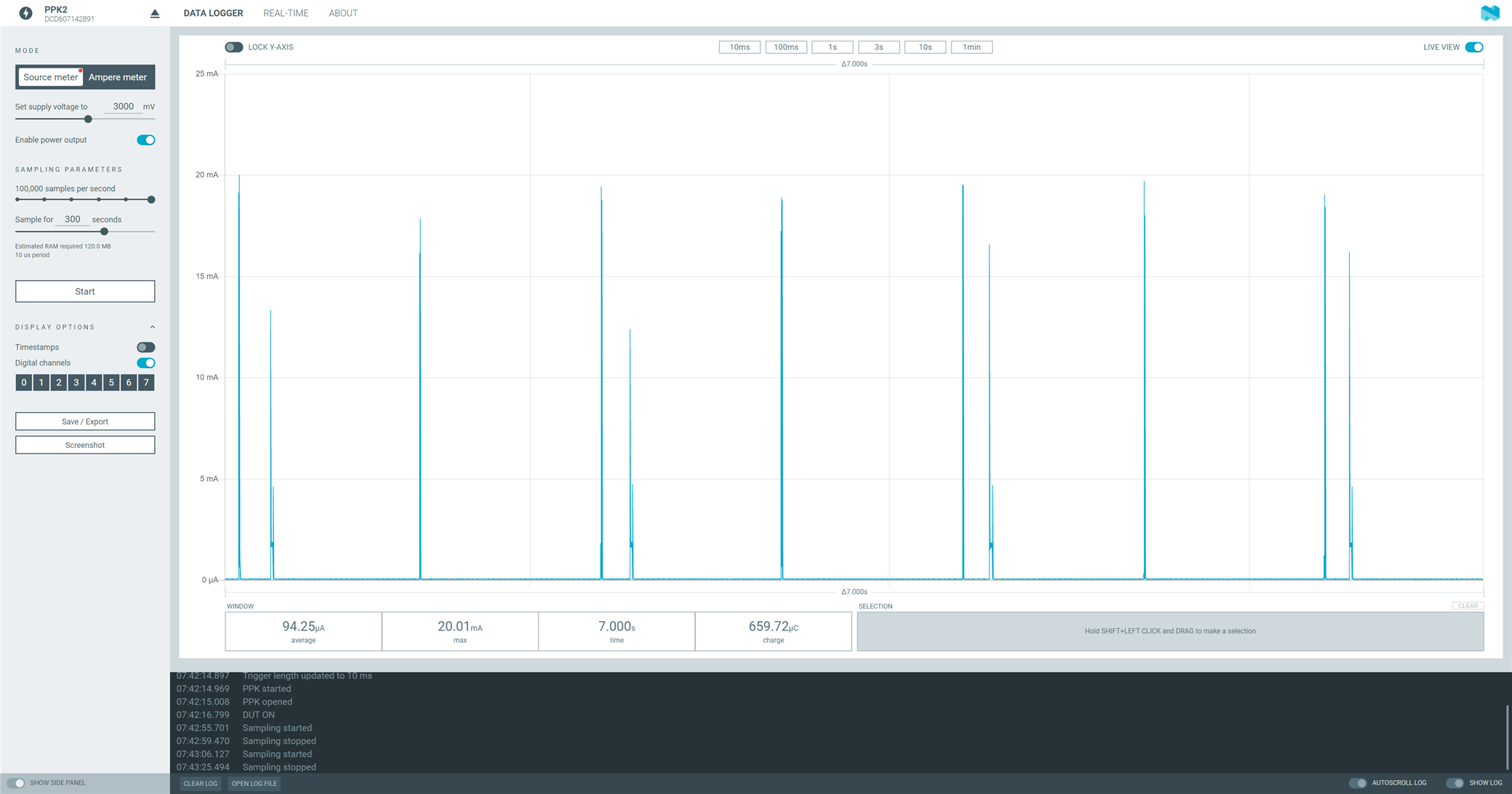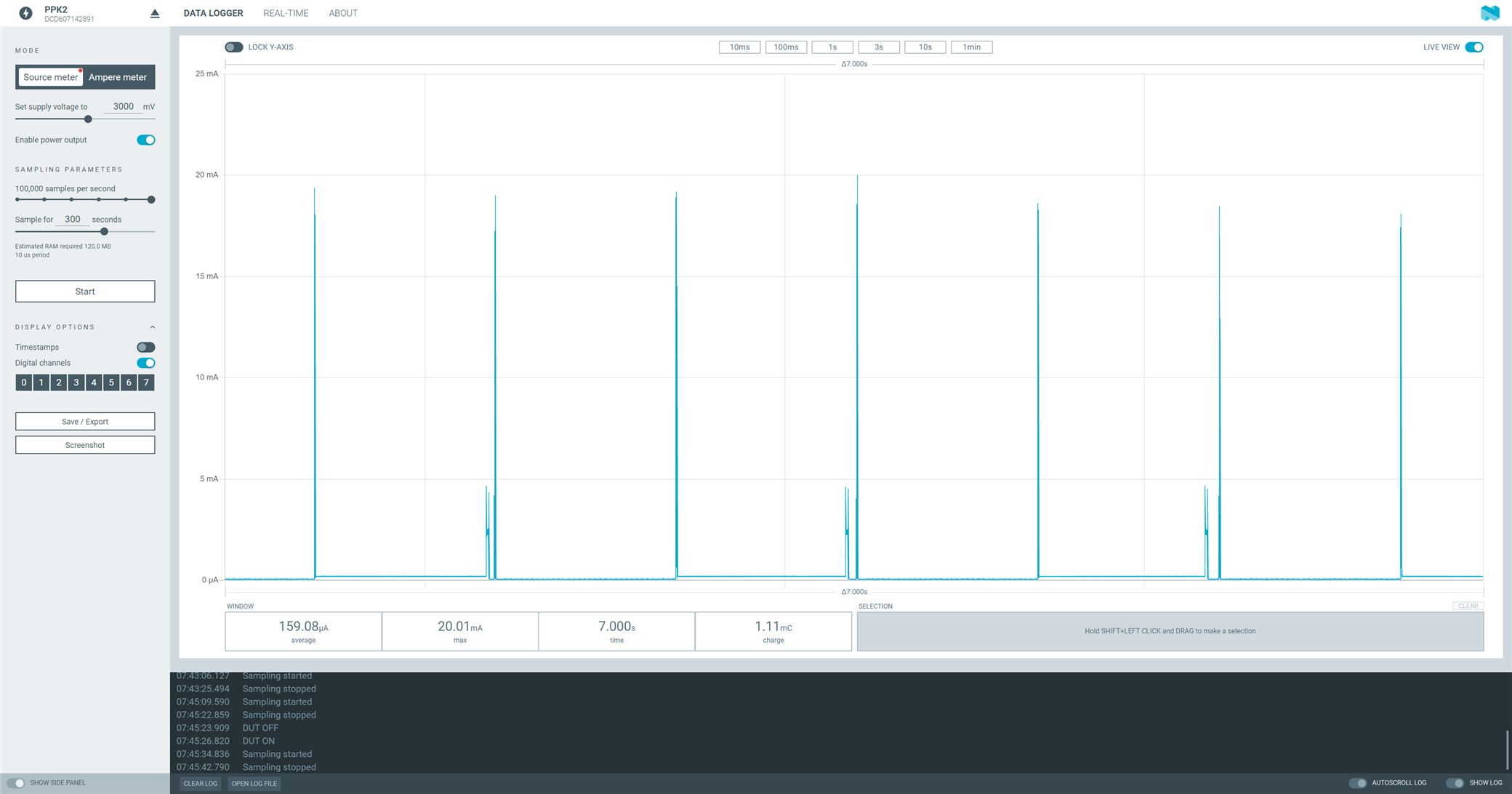My application flashes an LED periodically, and I would like to synchronize the LED flashing with radio idle time in order to minimize max current draw. It seems that using MPSL Timeslots is the preferred method. Using timeslots appears to be working in that I can schedule my LED on time to occur when the radio is idle. Unfortunately, it appears that there is increased power consumption during the time between radio events up until my work is to be scheduled.
In my first test case (non-mpsl.png), I setup for slow advertising (1s), and I flash an LED briefly every 2 seconds. As can be seen, the power consumption rises when the LED is active, but is otherwise low, except for periodic radio events (advertisement).

In my second test case, instead of flashing the LED based upon a timer, I schedule an MPSL timeslot. The LED flashing occurs as expected, but I noticed that during the time between radio events for which my code is scheduled to run, the current is higher than idle until after my timeslot is executed. Since MPSL schedules my timeslot near the end of the time between radio events, my average current draw is much higher than when I don't use MPSL. Why? If MPSL Timeslots are not the proper method to schedule event so that they don't overlap with radio events, please advise an alternate method.

My code is taken straight from the MPSL example.
static mpsl_timeslot_signal_return_param_t *mpsl_timeslot_callback(
mpsl_timeslot_session_id_t session_id,
uint32_t signal_type)
{
(void) session_id; /* unused parameter */
mpsl_timeslot_signal_return_param_t *p_ret_val = NULL;
switch (signal_type) {
case MPSL_TIMESLOT_SIGNAL_START:
StatusLedOn();
/* No return action */
signal_callback_return_param.callback_action =
MPSL_TIMESLOT_SIGNAL_ACTION_NONE;
p_ret_val = &signal_callback_return_param;
/* Setup timer to trigger an interrupt (and thus the TIMER0
* signal) before timeslot end.
*/
nrf_timer_cc_set(NRF_TIMER0, NRF_TIMER_CC_CHANNEL0,
TIMER_EXPIRY_US);
nrf_timer_int_enable(NRF_TIMER0, NRF_TIMER_INT_COMPARE0_MASK);
break;
case MPSL_TIMESLOT_SIGNAL_TIMER0:
StatusLedOff();
/* Clear event */
nrf_timer_int_disable(NRF_TIMER0, NRF_TIMER_INT_COMPARE0_MASK);
nrf_timer_event_clear(NRF_TIMER0, NRF_TIMER_EVENT_COMPARE0);
if (request_in_cb) {
/* Request new timeslot when callback returns */
signal_callback_return_param.params.request.p_next =
×lot_request_normal;
signal_callback_return_param.callback_action =
MPSL_TIMESLOT_SIGNAL_ACTION_REQUEST;
} else {
/* Timeslot will be ended */
signal_callback_return_param.callback_action =
MPSL_TIMESLOT_SIGNAL_ACTION_END;
}
p_ret_val = &signal_callback_return_param;
break;
case MPSL_TIMESLOT_SIGNAL_BLOCKED:
case MPSL_TIMESLOT_SIGNAL_CANCELLED:
break;
case MPSL_TIMESLOT_SIGNAL_SESSION_IDLE:
break;
case MPSL_TIMESLOT_SIGNAL_SESSION_CLOSED:
break;
default:
printk("unexpected signal: %u", signal_type);
error();
break;
}
return p_ret_val;
}
nRF Connect SDK 1.6.1
Segger Embedded Studio v5.50c
In my complete application, I am periodically (10 Hz) sampling a sensor while streaming BLE data and I would like to ensure that I am not performing radio activities at the same time as sampling my sensor. The LED flashing example is a simpler case, useful for this discussion.


